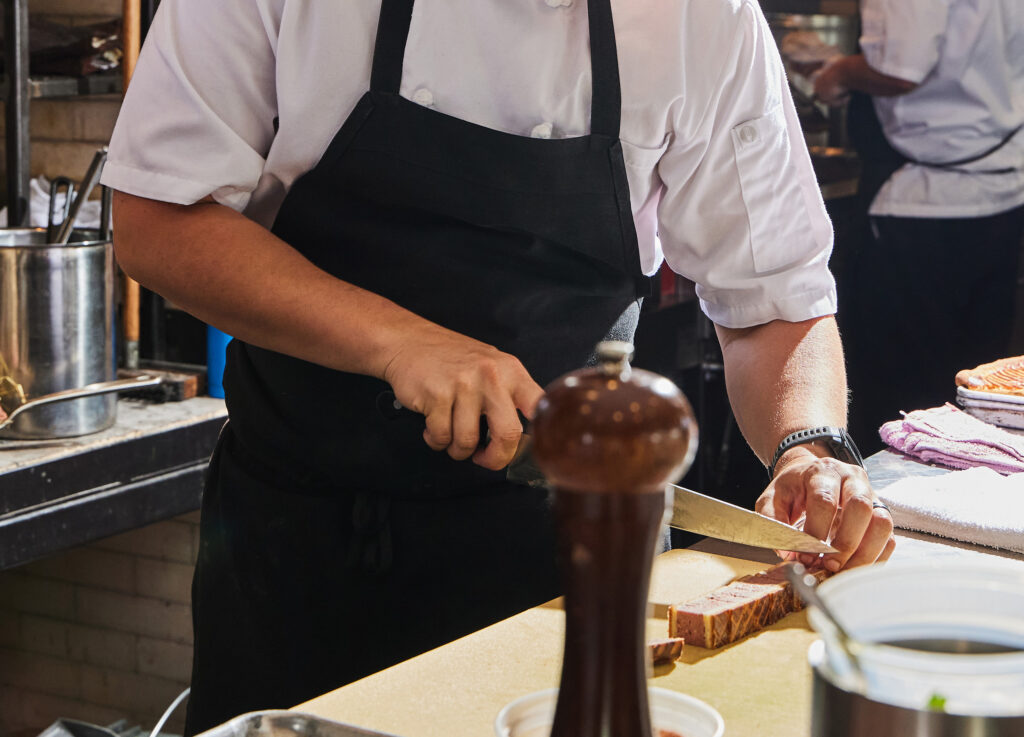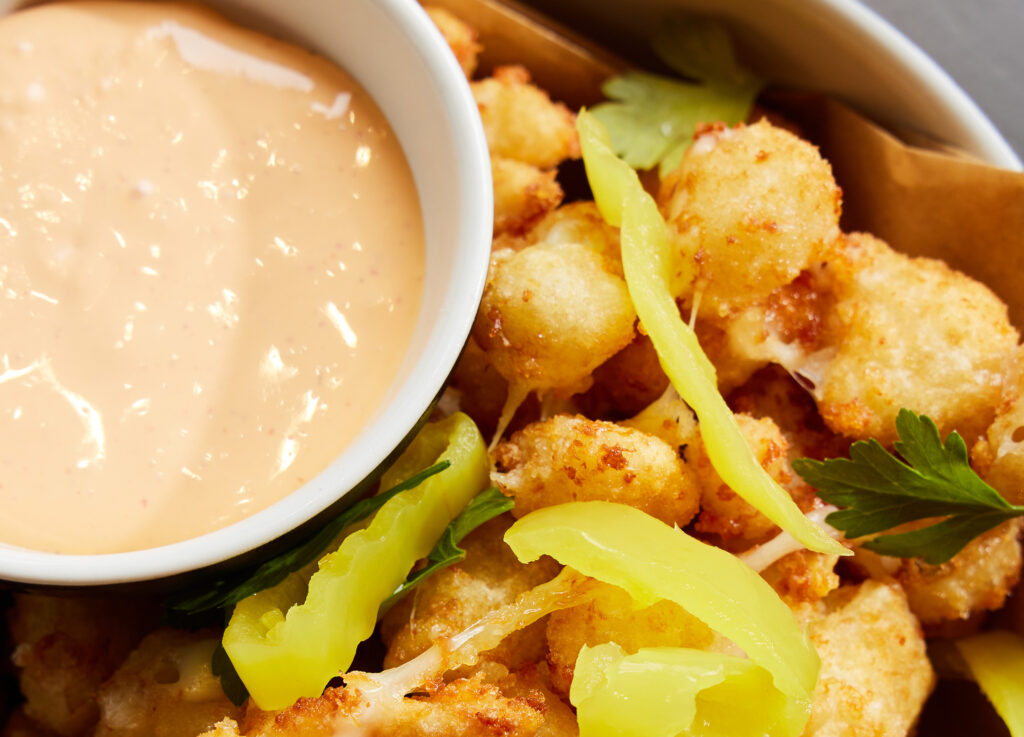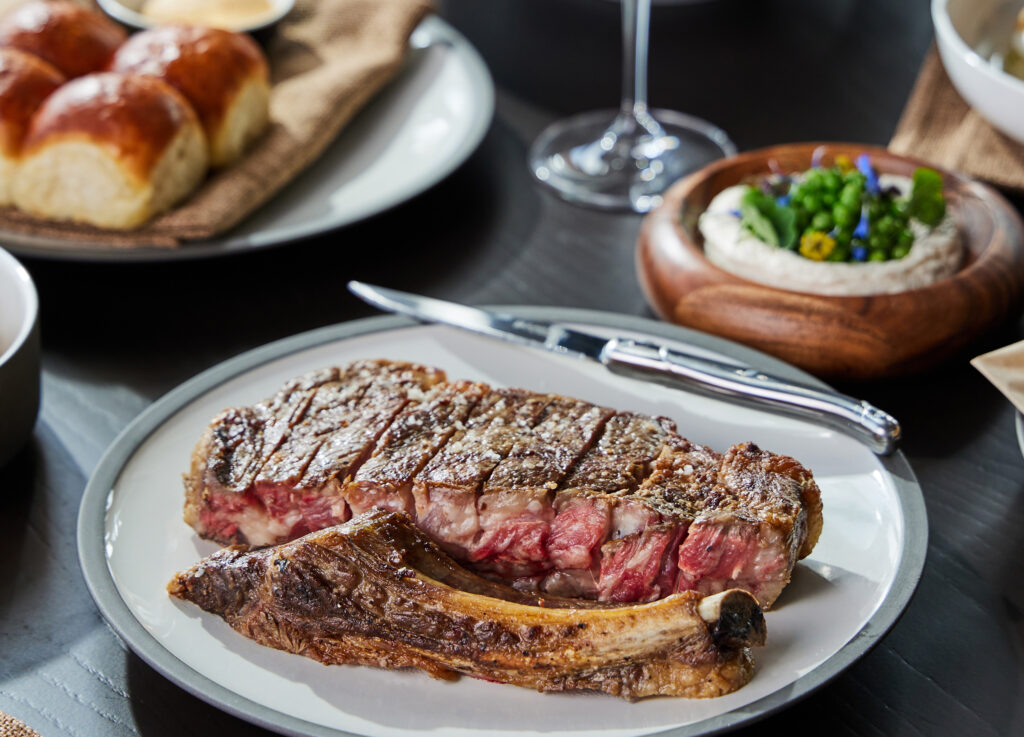Wrong link! Apologies, our newsletter mistakenly included a link to this story instead of “How 4 Famous KC Foods were invented.” For that story, click here!
Acre is located in a blandly commercial stretch of Parkville, across from a strip mall hair salon and down a block from a Sonic drive-in. It occupies a building that was once a sports pub, though chef-owner Andrew Longres’ transformation is thorough: Acre’s walls are cast in sophisticated swatches of gray, offset by moody black tabletops and dark wood accents. The spotlight is on the open kitchen, a bright, white space helmed by Longres.
Longres chose his zip code intentionally. Parkville is home—he lives there with his wife and children—and Acre is named for Rolling Acres, the family farm in Liberty he grew up roaming. He bills the menu at Acre as “modern Midwestern cuisine,” with most produce grown locally and most meat coming from the Midwest, with the occasional exception for Texas wagyu.
“We have to be able to have grown, raised or procured it on the farm,” Longres says. “That’s the rule. That’s the brand.”
At a glance, Acre’s menu would also suggest that the brand is stuck somewhere in the early aughts. There’s a Caesar salad, steak tartare, trout almondine and substantial cuts of beef offered with béarnaise. It’s not a particularly exciting list: You’ve seen all these things before.

Or have you? Longres spent three years at Napa Valley’s renowned French Laundry before moving back to Kansas City to head up the kitchens at Bluestem and The American. He infuses originality into many of his tried-and-true classics. I am still thinking about the smoked tomato soup, a ten-dollar bowl that Longres calls “homey.” Perhaps this dish started as the girl next door, but Longres transforms it into a red carpet bombshell. Sliced baby heirloom tomatoes, torn chunks of Farm to Market’s rustic wheat bread, jagged mountains of aged cheddar and a sprig of basil are arranged in a pretty crescent, and this is what will grin up at you from the bowl while your server releases tiger-colored liquid velvet from a carafe. This is grilled cheese and tomato soup all grown up.
Although the cooking is precise and occasionally theatrical, Acre is only modestly ambitious. This is not a fine dining restaurant (note the burlap-style linens and offering of fried cheese curds). Longres’ aim was upscale-casual, which means that as long as you’re down to pay upwards of sixty dollars for a steak, you’re welcome to wear flip-flops and bring your toddler. (In fairness, you can get by on a relative budget at Acre: The least-expensive entree is an eight-ounce burger with fries for eighteen dollars.)
When you first sit down at Acre, your server will rattle off a bit about how the restaurant is farm-to-table, which feels a little redundant, because of course it is—consumers expect it to be. Your server will then inform you that you must make all your food decisions up front so that the chef can course them out appropriately for you, which doesn’t sound all that casual.

The focal point of the menu is dry-aged steaks. These are also the least interesting among Acre’s offerings, but Longres taps into the nostalgia of his boyhood farm days and the Cowtown legacy. Steak enthusiasts may choose from a twelve-ounce strip loin (sixty-five dollars), a fourteen-ounce ribeye (seventy dollars) and a forty-ounce bone-in ribeye (one hundred and sixty dollars). All are aged between twenty-one and forty-five days, which means that they taste better—beefier—than un-aged steaks, although if you’re going to appreciate the buttery melt of a medium-rare bite, you’ll need to eschew the temptation of dragging it through béarnaise sauce.
The best value at Acre may well be the twenty-five dollar pickle-brined fried chicken entree. Two thighs and two tenderloins receive an impeccable breading—perfect thickness, with crunchy Grand Canyon ridges—and are swathed with a peppery hot sauce and ember-fused honey. Kansas City has never been short on fried chicken outlets, but the Acre plate—dotted with dill and sliced pickles and served with fries—crackles with personality.
The trout almondine could have borrowed a bit of that. It is technically excellent: The kitchen crushes almonds to specific diameters for an even cook, and they are a beautiful texture atop an impeccably cooked freshwater fish (you will never find saltwater seafood at Acre). But the accompanying almond cream was more mild than it needed to be, the pole beans were lukewarm and the wild rice was forgettable. And, alas, though the combined flavors of a dry-aged pork chop, sweet peaches and chili jus were successful, the chop itself was overcooked and disappointingly chewy.

But there is far more to like at Acre than not. I was skeptical about the Wisconsin cheese curds, but Longres presents a golden pile of panko-breaded gooey goodness that is as generously portioned as it is delicious. (However, as a longtime Wisconsinite, I cannot forgive the substitution of pimento cheese mousse in lieu of ranch dip, no matter how original it may be.) The tartare features dry-aged Akaushi wagyu and a dressing adapted from Longres’ grandmother’s mustard recipe, with a cooked egg whipped in—it’s wet but not cloying. Acre’s single pasta, a braised rabbit cappelletti, is light and lovely. And prepare to become obsessed with Acre’s hearty Caesar salad, a balance of crunchy romaine, creamy dressing (spiked with smoked creme fraîche) and flavor bursts of fried saltines.
Desserts are fairly standard—there is a nice lavender cheesecake, a lemon cake and a dark chocolate cremeux that is really a deconstructed s’mores. Happily, the wine program reaches beyond steakhouse pairings, carrying enough new and old world vintages at varying price points to have broad appeal. And the cocktails are much better than they need to be: The Missouri Wildfire is a twist on a margarita, with mezcal and a peach-habanero shrub. And if you like strong drinks and the scent of Douglas fir candles, the Wooded Acre martini is for you.
Acre was much-hyped in the lead-up to its opening, and it’s likely that many expected an elaborate fine dining exercise from Longres. But Kansas City probably doesn’t need another iteration of The American.
Acre certainly fills a void in Parkville—Longres particularly wanted Parkvillians with discerning taste to be able to get a “really good cocktail.” Perhaps the most ambitious thing about Acre is its aim to appeal to a wide audience by being fancy enough for special occasions and chill enough for any weeknight. Longres doesn’t seem to be trying to impress anyone with fine dining tricks, but he does show off with subtle flourishes—a house-made ricotta dip, tomato water as vinaigrette—that mark Acre as something special.






